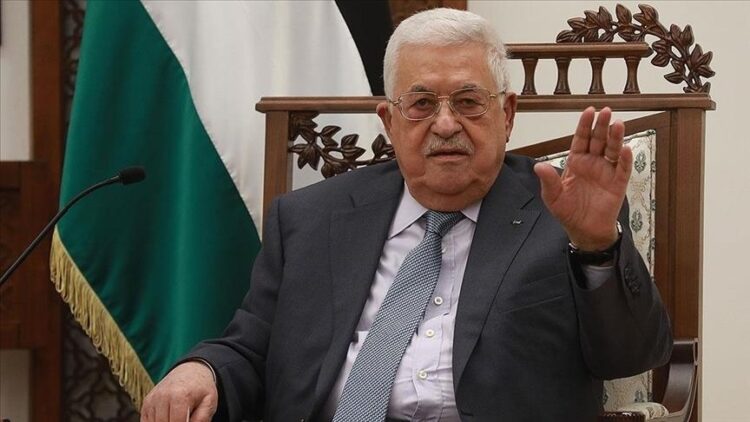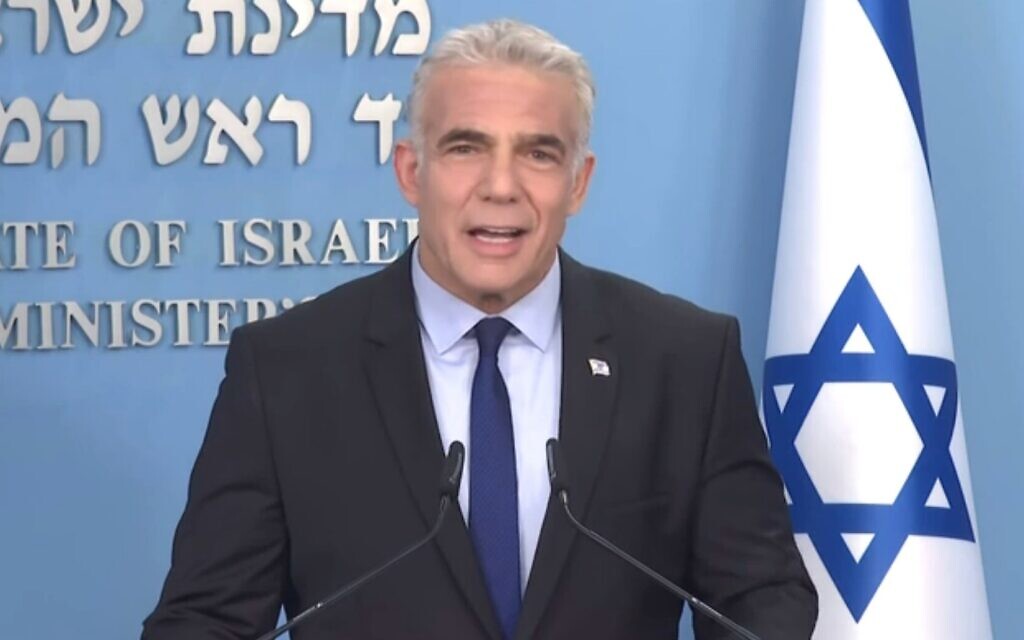One can only hope that Israeli Prime Minister Yair Lapid was sincere when he endorsed a two-state solution in a speech he delivered at the United Nations on September 22.
Speaking to the General Assembly, Lapid declared, “An agreement with the Palestinians, based on two states for two peoples, is the right thing for Israel’s security, for Israel’s economy and for the future of our children.”
Lapid said that Palestinian statehood was contingent on several conditions: “That a future Palestinian state will be a peaceful one. That it will not become another terror base from which to threaten the well-being and the very existence of Israel. That we will have the ability to protect the security of all the citizens of Israel, at all times.”
The caveats set forth by Lapid are exceedingly sensible and reasonable. Palestinian statehood, though morally justifiable and long overdue, should not impinge on Israel’s security or undermine the day-to-day safety of its citizens.
This is fundamental.
In publicly calling for a two-state solution, which is supported by the major powers and nearly every member state of the United Nations, Lapid let it be known that Israel is theoretically no longer an obstacle to Palestinian statehood.
Lapid’s last two predecessors, Benjamin Netanyahu and Naftali Bennett, staunchly opposed it and focused instead on challenging Iran’s military entrenchment in Syria and its budding nuclear program.

These are worthy goals, to be sure, since Iran has been Israel’s deadliest enemy since the 1979 Islamic revolution. But Netanyahu’s and Bennett’s strategy of minimizing and sidelining the Palestinian issue was patently unwise and counter-productive.
It hardened Palestinian frustration and anger in the West Bank, which is largely occupied by Israel. It created a new generation of Palestinian terrorists intent on murdering Israelis. It sowed the seeds of a third Palestinian uprising. It coarsened Israeli society. It contributed to Israel’s international image as an oppressor of Palestinians. It laid the groundwork for Israel’s incremental transformation into a binational state.
Lapid presumably took these compelling factors into account when he came out in support of a two-state solution. But in advocating this pragmatic approach, was he really serious?
It’s a fair question in light of his record as a government minister, the nature of his eight-party coalition, and his relationship with the leadership of the Palestinian Authority.
As finance minister in one of Netanyahu’s governments, Lapid kept his views on the Palestinians largely to himself. Outwardly, he accepted the status quo in the West Bank and Netanyahu’s misguided belief that the Palestinian question can be managed rather than resolved.
As foreign minister and alternate prime minister during Bennett’s one year premiership, Lapid respected his aversion to Palestinian statehood, and was only willing to grant the Palestinians cosmetic and economic concessions, which are not nearly enough to satisfy the Arab residents of the West Bank.

Not once during this period did Lapid bother to meet Palestinian Authority President Mahmoud Abbas or any of his senior officials. He left that task to Defence Minister Benny Gantz, a political rival who aspires to be prime minister.

With a general election slated to take place on November 1, Lapid is clearly reluctant to rock the boat too much, particularly in light of surveys indicating that Netanyahu may roar back to power.
Netanyahu, of course, blasted Lapid’s speech, saying he was “bringing the Palestinians back to the forefront of the world stage” and offering them “a terrorist state in the heart of the country, a state that will threaten us all.”
Bennett, Lapid’s political partner, issued a similar warning, claiming “there is no place or logic in floating anew the idea of a Palestinian state.”
Lapid should not listen to these voices of gloom and doom. He should abide by his apparent principles and continue to work for a rapprochement between Israel and the Palestinians, which is doubtless in Israel’s short-term and long-term interests.
The unresolved Palestinian issue is a tinderbox that could explode at any moment. Lapid recognizes the severity of the problem, but is he truly willing and able to do something about it?
It’s debatable, but according to Americans for Peace, there is a jarring disconnect between Lapid’s fine words and his actions.
“Tragically, they are not backed up by policies of his government. An Israeli government that genuinely seeks a two-state solution … must adopt policies that enhance this vision. It must stop West Bank settlement construction. It must dismantle outposts that were built in violation of Israel’s own laws rather than legalize them. It must pursue direct peace negotiations with the Palestinian leadership.”
Is Lapid ready to embark on a such a path? Time will tell.
